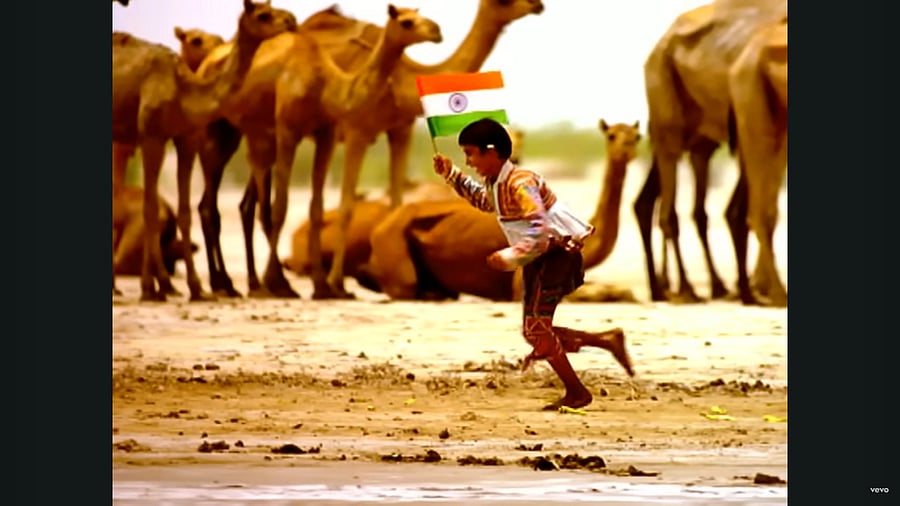
Credit: Special arrangement
Vande mataram has taken on many avatars in the 150 years since it first appeared in 1875 in a literary journal. It was written by Bankim Chandra Chatterjee and later appeared in his novel ‘Anandmath’. Many composers, including Master Krishnarao, Hemant Kumar and A R Rahman, have created tunes for it. The tunes range from the prayerful to the rousing, spanning styles as diverse as raga and rock.
Some of the earliest tunes, such as the one composed by Pandit Jadunath Bhattacharya soon after it was written, are lost. The version sung on November 7 in Delhi, in the presence of the prime minister, marks a return to a style popularised by All India Radio. Mysore Manjunath, the renowned violinist, conducted an orchestra of classical musicians rendering the song in raga Desh. It is estimated that at least a hundred versions of ‘Vande mataram’ exist. Even when the full song is not sung, the refrain is used in literature, theatre and cinema to represent the nationalist sentiment. The government has announced year-long celebrations to honour the song in its 150th year.
The earliest recordings of ‘Vande mataram’, including the ones sung by Master Krishnarao and Pandit V D Paluskar, are based on ragas popular in Hindustani music. Karnatik music icon M S Subbulakshmi has sung a couple of versions. Pandit Omkarnath Thakur sings the song in raga Kafi, with classical ornamentations and without any rhythmic accompaniment. Quite a few of these versions are available on YouTube. When we hear them today, amid the profusion of styles the song is explored in, they sound like classical compositions rich in raga improvisation. More recent anthems, including the Kuvempu poem sung in Karnataka as the state anthem, refrain from any improvisation — they are composed to a strict structure, and crafted in a manner that makes it easy for everyone to sing. Raga elaboration calls for a degree of formal training and mastery.
The origins of the most popular version yet, sung on All India Radio, is shrouded in mystery — was it Pandit Ravi Shankar, who worked for AIR, Pandit V R Athavale, who headed the Delhi station of AIR, or a musician whose name everyone has forgotten? Based on Desh, a raga that must have suggested itself for a song about the nation, it is a serene contemplation. Time is marked, but it is not march-like.
The tune composed and sung by Hemant Kumar, with a reprise by Lata Mangeshkar, is more upbeat in its approach. Featured in the film ‘Anandmath’ (1952), it plays on the commercial channel of AIR alongside other film songs. In 1997, A R Rahman’s album ‘Vande Mataram’ featured multiple versions of the song, including one in Tamil. ‘Maa tujhe salaam,’ which he sang, sounds way more aggressive than the AIR tune we had heard for decades.
‘Vande mataram’ was widely sung as a protest during the freedom movement, and the British had banned it. Rabindranath Tagore and others sang it and at the Congress conventions. When independent India had to choose a national anthem, it was seen as a natural choice, but it lost to ‘Jana gana mana’. Not everyone was in favour of ‘Vande mataram’. Since the 1930s, it had run into opposition from Muslim leaders who found stanzas praising the Hindu goddess Durga making it religious and thus unacceptable. Jinnah was among those who opposed the song. One of the points raised, to stop it from becoming the national anthem, was that the novel had anti-Muslim undertones. Another was that the tunes did not lend themselves to Western orchestration and the military band style. Master Krishnarao, it is said, was upset by this argument, and composed several tunes that could be adapted to an orchestral style.
The story goes that Bankim Chandra, who served as a civil servant in the British government, was upset at the British insistence on ‘God save the King’, and wrote ‘Vande mataram’ as an answer to the colonial anthem. Written in Sanskrit and Bengali, it has travelled a long way, although, like ‘We shall overcome’, it hasn’t travelled wide. In 1950, the Constituent Assembly left out the verses considered offensive by Muslims, and recommended that the first two verses, which intensely evoke the beauty of the land, for public rendering. It also placed ‘Vande mataram’ on a par with ‘Jana gana mana’. The BJP looks at the excision as a ‘Nehruvian distortion’. Some of the dust has settled, but the song will continue to remain a point of political debate.